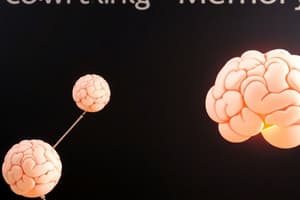Podcast
Questions and Answers
What is the primary problem faced by W.R. due to his astrocytoma?
What is the primary problem faced by W.R. due to his astrocytoma?
- Loss of ability to control his life and make rational life plans (correct)
- Abnormal speech skills
- Impaired short-term and long-term memory
- Loss of perception and motor skills
What is the primary function of the prefrontal cortex (PFC)?
What is the primary function of the prefrontal cortex (PFC)?
- Goal-oriented behaviour and making rational life plans (correct)
- Processing of sensory information
- Control of motor skills
- Regulation of emotional responses
What is the defining characteristic of perseveration?
What is the defining characteristic of perseveration?
- The inability to make decisions
- The inability to control impulsive behaviour
- The persistence in a response despite it being incorrect (correct)
- The lack of emotional response to stimuli
What is the effect of unilateral lesions of the PFC?
What is the effect of unilateral lesions of the PFC?
What is the term for the extreme inflexibility and dependence on prototypes?
What is the term for the extreme inflexibility and dependence on prototypes?
In which neurological disorders do cognitive control deficits commonly occur?
In which neurological disorders do cognitive control deficits commonly occur?
At what age is the prefrontal cortex fully developed?
At what age is the prefrontal cortex fully developed?
What is the connection between the networks that the PFC is responsible for?
What is the connection between the networks that the PFC is responsible for?
What is the primary difference between an action-reward link and a habitual action?
What is the primary difference between an action-reward link and a habitual action?
What is the primary function of working memory in maintaining a behavior?
What is the primary function of working memory in maintaining a behavior?
What type of cells in the LPFC are involved in firing for specific objects?
What type of cells in the LPFC are involved in firing for specific objects?
What is the role of working memory in achieving goals?
What is the role of working memory in achieving goals?
What is the primary difference between normative and descriptive decisions?
What is the primary difference between normative and descriptive decisions?
What is an example of a normative decision-making scenario?
What is an example of a normative decision-making scenario?
What is the role of cognitive control in waiting to start eating dinner?
What is the role of cognitive control in waiting to start eating dinner?
What is the primary function of working memory in decision making?
What is the primary function of working memory in decision making?
Flashcards are hidden until you start studying
Study Notes
Case W.R. and Cognitive Control Deficits
- W.R. suffers from astrocytoma with a lesion in the left lateral PFC, resulting in the loss of ability to control his life and make rational life plans.
- Despite having normal perception, motor, speech skills, IQ, and short- and long-term memories, W.R. exhibits abnormal behavior, including perseveration.
Cognitive Control (Executive Function)
- A set of psychological processes that help us use perception, knowledge, and goals to choose an action or thought.
- Goal-oriented: Most of our behaviors are led by a goal, which must be flexible and adaptable to changes.
- Structures involved in cognitive control include:
- PFC (Prefrontal Cortex)
- Lateral PFC (for planning and initiating a behavior)
- Medial Frontal Cortex (guides behaviors and maintains them)
Prefrontal Cortex (PFC)
- What makes us unique as a species.
- The latest brain structure to fully develop (around 25 years old).
- Connects perceptual, motor, limbic, and association areas.
Cognitive Control Deficits
- Can result in abnormal behavior, such as perseveration, apathy, distractibility, impulsiveness, and difficulty making decisions, planning actions, and understanding consequences.
- Unilateral lesions of PFC tend to produce relatively mild deficits, while bilateral lesions result in more dramatic changes.
- Pathologically, cognitive control deficits can be seen in ADHD, OCD, psychopathy, and addiction.
Goal-Oriented Behavior
- We have two types of actions:
- Goal-oriented actions (based on a link between an action and a reward)
- Habitual actions (no rewards involved; simply a habit)
Cognitive Control and Working Memory
- Working Memory (WM) is important for maintaining a behavior.
- WM makes use of:
- Maintenance of behavior
- Selective attention
- Perceptual analysis
- Response inhibition
Physiological Correlate of Working Memory
- LPFC (Lateral Prefrontal Cortex) is involved in WM.
- LPFC contains:
- What cells (fire for specific objects)
- Where cells (fire in specific places)
- What-Where cells (respond to combos of objects + places)
Decision Making
- Decisions must be taken based on the optimal choice among all available circumstances and options.
- Two theories in decision making:
- Normative decisions (when people make decisions that lead to the optimal choice)
- Descriptive decisions (what people actually do; not what people should have done)
Studying That Suits You
Use AI to generate personalized quizzes and flashcards to suit your learning preferences.



